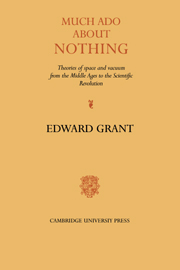 Much Ado about Nothing
Much Ado about Nothing Part I - Intracosmic space
Published online by Cambridge University Press: 07 October 2011
Summary
The concept of space that will be of primary concern in this volume is one in which space was regarded as something separate from material body. With a few rare exceptions, that separate space was associated with a vacuum that was assumed to exist either within the confines of a finite, spherical universe, as described by Aristotle, or beyond the bounds of that universe, extending infinitely in every direction.
Although our study focuses on the period between the thirteenth and seventeenth centuries in Western Europe and, except for the last two chapters, is largely confined to the Aristotelian scholastic tradition, the central role of vacuum in the history of spatial theories was firmly established in the fifth century B.C., when Greek atomists designated void as a “nonbeing” that was as real as the hard, impenetrable, and eternal atoms that randomly moved and collided through its infinite extent. The atomist identification of real, albeit empty, space with “nothing” guaranteed that the history of spatial concepts would, from its inception, be rooted in paradox and enigma. Described and defined as nothing by the terms that came to represent it – kenon in Greek; inane, vacuum, and nihil in Latin – the void was from the outset, and almost inevitably, subjected to a double entendre. Was it an unintelligible, total privation incapable of existence – a true “nothing”?
- Type
- Chapter
- Information
- Much Ado about NothingTheories of Space and Vacuum from the Middle Ages to the Scientific Revolution, pp. 1 - 4Publisher: Cambridge University PressPrint publication year: 1981


